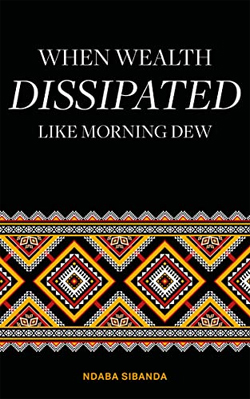When Wealth Dissipated Like Morning Dew by Ndaba Sibanda
How does WWDLMD present the challenges or issues surrounding the continent of Africa?
When Wealth Dissipated Like Morning Dew is an Afrocentric, holistic and cautiously-curated work of poetry that explores and tackles critical themes like climate change, conservation, culture, trade and debt, corruption, technology and innovation, food security, and justice, among other related and relevant topics and matters of concern.
A number of reports have suggested that climate change in Africa is a security threat. Environmentalists have expressed fears that ecological degradation and demographic pressures will result in the displacement of many African inhabitants and generate a social, political and economic commotion. Think of health challenges by virtue of air pollution and extreme heat, pressures on mental health, poor nutrition, increased hunger and forced displacement.
The book touches on several negative impacts of climate change in Africa, including the scourges of food security and water security as a result of the ever-changing rainfall patterns that affect agriculture. The text also argues that Africa is clearly climate-vulnerable and that the evidence of a climate crisis is all around us since its impacts fall disproportionately on the world’s most underprivileged countries and communities. Africa is no exception. Climate change poses a critical and existential threat to Africa’s economic growth, peace, ecosystems and animal and plant species as evidenced by a series of droughts, famine, floods, destruction of the infrastructure, deforestation, soil erosion and increased pest infestations and illnesses.
The book also bemoans bigotry, bungling, greed, corruption, injustices, woes and wars that continue to haunt and hurt the prospects, development and dynamism of Africa. On a positive note, the collection pays tributes to a number of gallant and perceptive monarchal stars of yesteryear like Makeda, the Queen of Sheba, Queen Lozikeyi, Queen Njinga Mbandi, Queen Hatshepsut, Queen Amina, Empress Kandake, Empress Taytu Betul and Queen Aminatu. It also features modern-day African icons and beacons in different fields, namely musician Yvonne Chaka Chaka, Kenya’s Elluid Kipchoga, Zimbawe’s Beatrice Mtetwa, Sadio Mane, Mario Batotelli and Andrea the Vocalist.
What factors have influenced my literary activism?
I do not only consider poetry as a figurative language but also as the most complete possible language and highest form of literature. It is full, meaningful and more than just a sweet-sounding language because it is a language of truth, pedagogy, performance, precision, action, revelation and perception.
As a practicing and passionate poet, I use the power and precision of poetry to highlight grave issues that affect Africa, be it the scourges of corruption, greed, prejudice and injustice. My poetry seeks to show humans that they can only ignore the climate change crisis at their own risk. After all, comparatively speaking, they are not only culpable but are also capable of becoming regenerative agents rather than degenerative ones. That is what our delicate and pained planet yearns for now. Is that too much to ask? What would they lose by being less wasteful and destructive, and more caring to Mother Nature?
Eco-denialism, which exhibits itself through denials and charades that climate change is a crisis, has to be exposed and dismantled for posterity and prosperity. For the advocates for action against climate change are not climate doomsday claimants and alarmists, but are caring and conscious realists. I am just a peace-loving, vigorous, and literary advocate of a noble cause that is close to my heart — that of seeking to protect the planet and its peoples and posterity. My literary activism is also aimed at the richest countries and individuals: they need to walk their talk and compensate and capacitate African countries otherwise their global climate change goals will remain an unnecessary, unfair, and harsh mirage and joke.
The United Nations’ Millennium Development Goals – which include the elimination of extreme poverty and hunger, reduction of child mortality, achievement of global primary education, promotion of maternal health, fighting malaria, HIV/AIDS and other diseases, development of a universal partnership and more importantly, the promotion of environmental sustainability — could all linger as a celebrated fantasy if the affluent countries do not accept their moral and historical obligation to help developing nations recover from the effects of climate change.

The Piker Press moderates all comments.
Click here for the commenting policy.